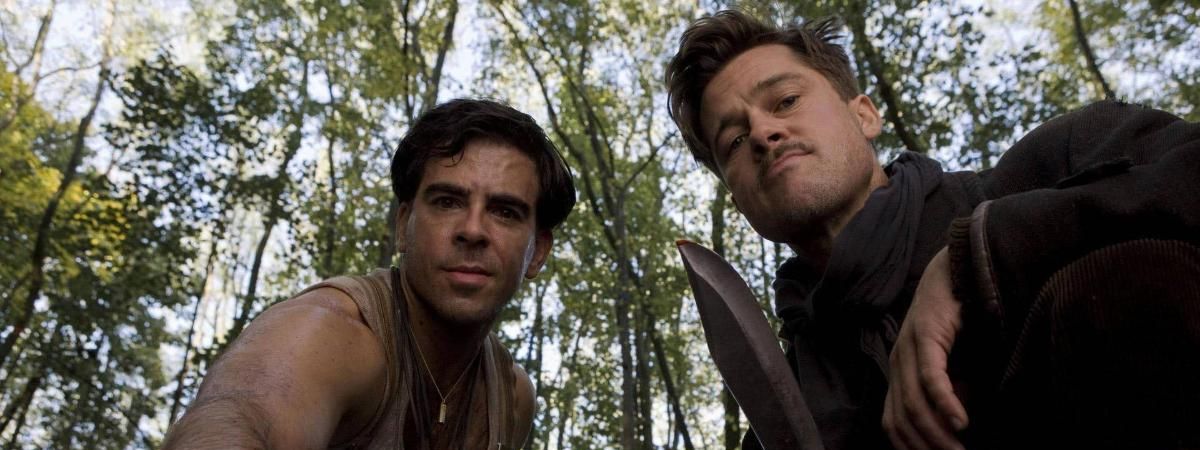Skip to the good bit
ToggleIn this upbeat rundown, we’ll rank his top 10 masterpieces, explore each movie’s essence, and celebrate the quirks that make them quintessential Tarantino.
#10 True Romance
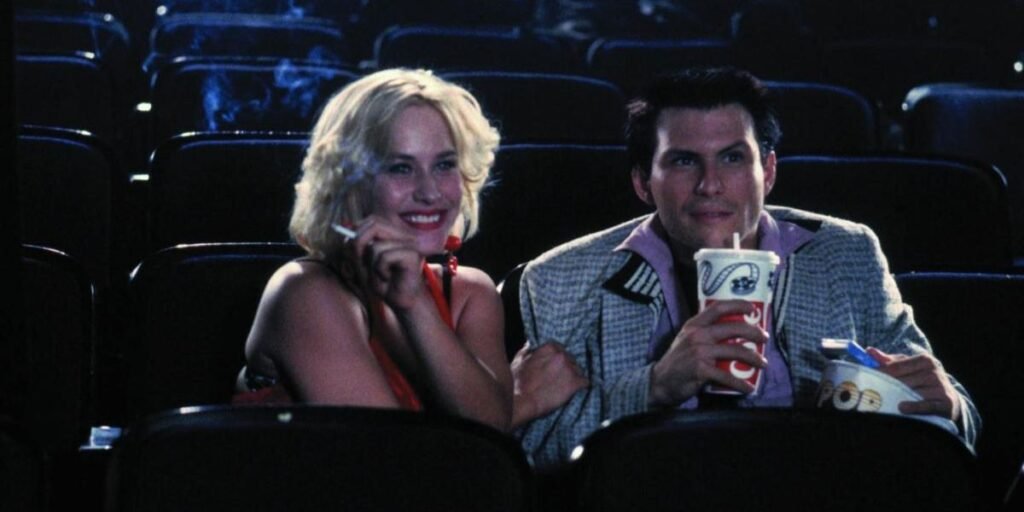
| Release date | 1993 |
| Genre | Crime, Romance, Thriller |
| Key cast | Christian Slater, Patricia Arquette, Dennis Hopper, Val Kilmer, Gary Oldman, Christopher Walken |
| Budget | $12.5 million |
| Box office | $12.3 million |
“True Romance” follows Clarence Worley (Slater) and Alabama Whitman (Arquette), a couple who meet, fall in love, and inadvertently steal a suitcase full of cocaine. Their whirlwind romance turns into a high-octane chase as they’re pursued by mobsters and law enforcement alike, journeying from Detroit to Los Angeles to sell the drugs and start a new life together.
While Tony Scott directed “True Romance”, Quentin Tarantino wrote the screenplay, and his unmistakable touch is evident throughout. The movie marries the spirit of a love story with the grittiness of crime drama, full of vibrant characters, sharp dialogue, and a quintessential Tarantino soundtrack that blends various genres.
“True Romance” stands out for its ability to balance gut-wrenching violence with moments of genuine affection between Clarence and Alabama. The ensemble cast, filled with memorable roles (Gary Oldman’s portrayal of Drexl Spivey is especially striking), makes the story come alive. The iconic scene between Hopper and Walken serves as a testament to Tarantino’s gift for crafting tension-filled dialogues. Though not directed by him, it’s a testament to Tarantino’s storytelling capabilities and is often included in lists of best Quentin Tarantino films because of its script.
While not directed by Tarantino, “True Romance” is undeniably shaped by his vision. It blends romance and crime seamlessly, reiterating his status as one of the best movie directors of all time, capable of crafting stories that resonate regardless of genre boundaries.
#9 Death Proof
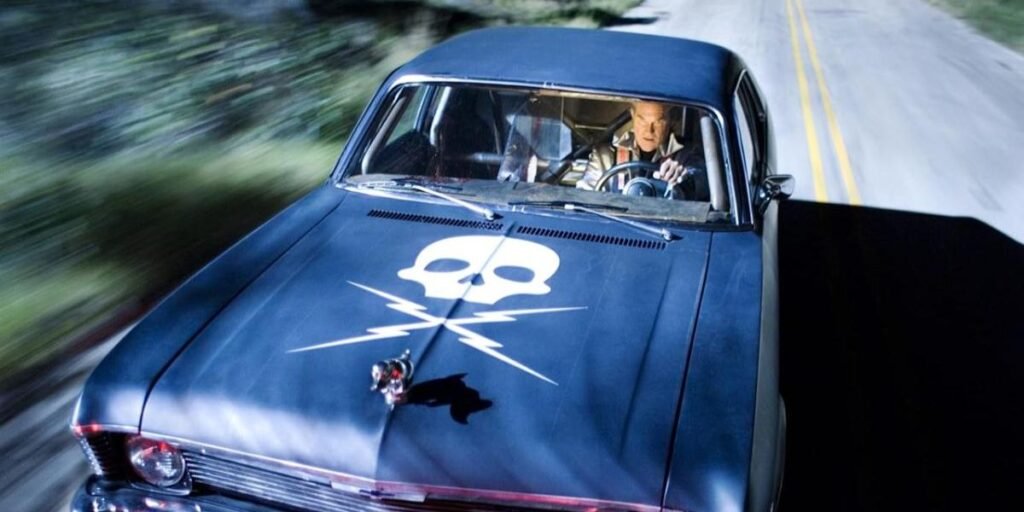
| Release date | 2007 |
| Genre | Thriller, Action |
| Key cast | Kurt Russell, Zoë Bell, Rosario Dawson, Vanessa Ferlito, Sydney Tamiia Poitier |
| Budget | $30 million (Grindhouse combined budget with Planet Terror) |
| Box office | $30.7 million (Grindhouse combined revenue) |
A homage to the grindhouse era of B-movies, “Death Proof” follows Stuntman Mike (Russell), who takes perverse pleasure in stalking and killing women with his death-proof car. However, he may have met his match when he targets a group of friends, including a fearless stuntwoman.
Tarantino replicates the grindhouse aesthetic by intentionally adding scratches and missing reels to the film, embracing the low-budget, rough-around-the-edges feel of the movies from the ’70s. The car chases are visceral, lending authenticity to the adrenaline-pumping sequences.
While “Death Proof” might not be as universally lauded as some of Tarantino’s other works, its raw energy and unabashed celebration of classic car-chase films make it unique. Kurt Russell’s menacing performance and Zoë Bell’s real-life stunts (she plays herself) add layers of authenticity and thrill to the narrative.
#8 The Hateful Eight
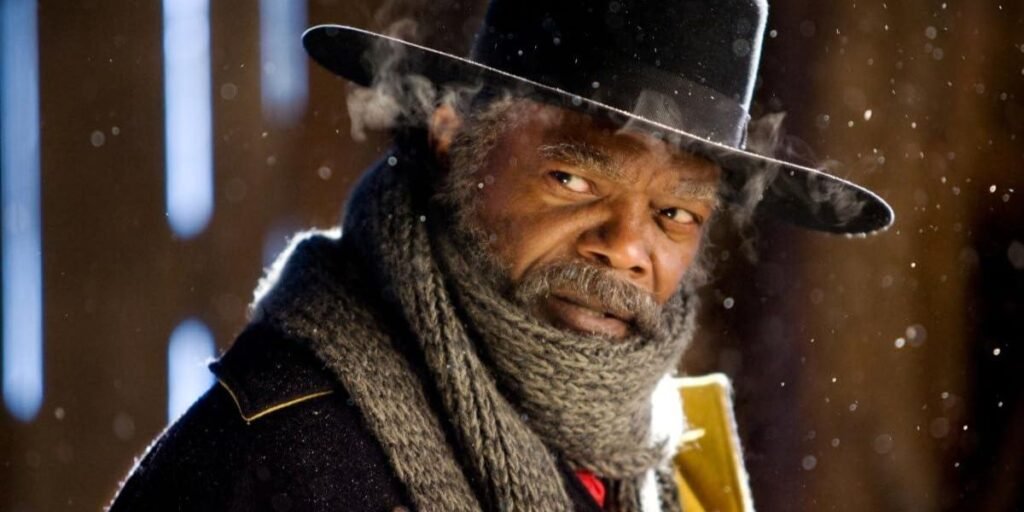
| Release date | 2015 |
| Genre | Western, Mystery |
| Key cast | Samuel L. Jackson, Kurt Russell, Jennifer Jason Leigh, Walton Goggins, Tim Roth |
| Budget | $44 million |
| Box office | $155.8 million |
Set some years after the Civil War, a bounty hunter and his captive seek refuge from a blizzard in a haberdashery. They’re joined by several other travelers, but as the storm rages outside, suspicions rise, and tensions explode within.
A mix of classic western and Agatha Christie-style mystery, the movie is marked by its constrained setting, drawing intense focus on its ensemble cast. Cinematographer Robert Richardson captures the chilling Wyoming landscape in 70mm, contrasting the vast outdoors with the claustrophobic interiors.
The contained environment of “The Hateful Eight” is a pressure cooker of tension, politics, and violence. The dialogue-heavy movie reveals layers of deceit and intrigue as each character’s backstory unfolds. Tarantino’s meticulous attention to detail, combined with a chilling score by Ennio Morricone, makes this a standout piece in his filmography.
#7 Jackie Brown
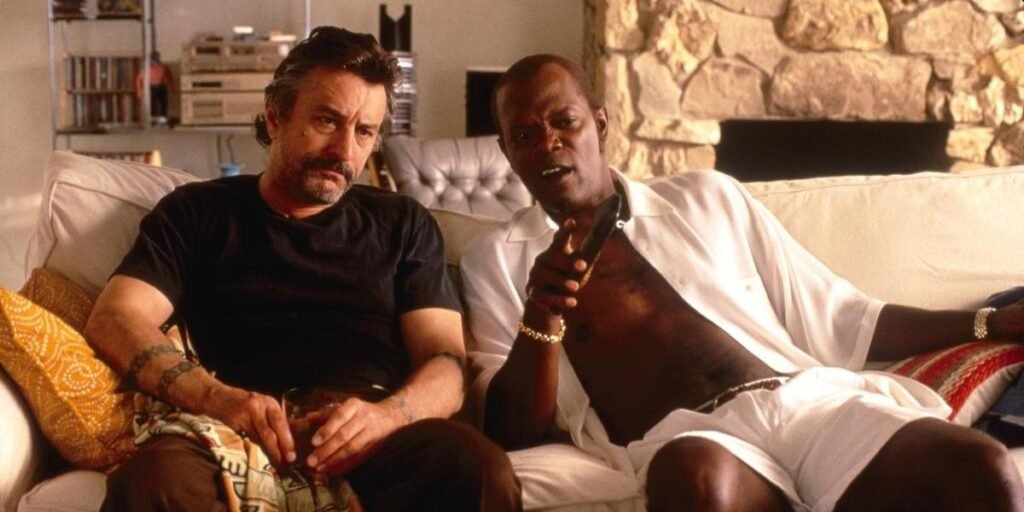
| Release date | 1997 |
| Genre | Crime, Drama |
| Key cast | Pam Grier, Samuel L. Jackson, Robert Forster, Bridget Fonda, Michael Keaton |
| Budget | $12 million |
| Box office | $74.7 million |
Based on Elmore Leonard’s novel Rum Punch, “Jackie Brown” centers on Jackie (Grier), a flight attendant who becomes embroiled in a scheme to play both the law and a gun runner against each other—all while aiming to pocket half a million dollars for herself.
“Jackie Brown” represents a departure from Tarantino’s traditionally frenetic pace. The movie lingers more on character development, offering deeper emotional nuances and a more restrained narrative. The 70s-inspired soundtrack sets the tone, making it a more mature, contemplative piece in Tarantino’s oeuvre.
“Jackie Brown” is a tribute to blaxploitation films and showcases Tarantino’s versatility as a director. Grier and Forster’s performances breathe life into their characters, grounding the movie in a unique realism within the Tarantino universe.
#6 Once Upon a Time in Hollywood
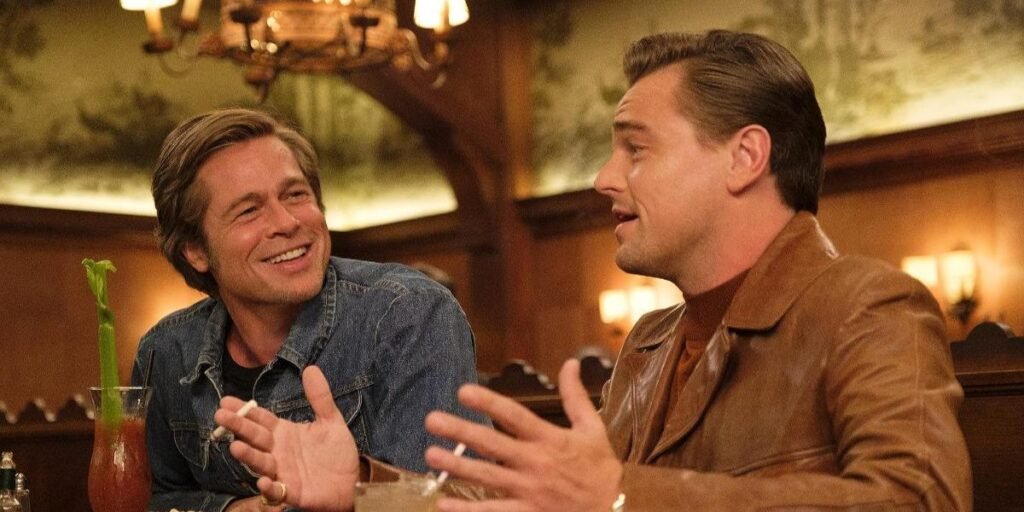
| Release date | 2019 |
| Genre | Comedy, Drama |
| Key cast | Leonardo DiCaprio, Brad Pitt, Margot Robbie, Al Pacino, Kurt Russell |
| Budget | $90 million |
| Box office | $374 million |
A fading actor, Rick Dalton (DiCaprio), and his loyal stunt double, Cliff Booth (Pitt), navigate the changing landscape of 1969 Hollywood against the backdrop of the Manson Family murders, with Sharon Tate’s (Robbie) story unfolding in parallel.
A nostalgic and sun-soaked journey, the movie is a tribute to the Golden Age of Hollywood and a classic Tarantino-esque revision of historical events. Real-life personas mesh with fictional characters, while meticulous period details paint a vivid picture of late ’60s LA.
The movie juxtaposes introspective moments with Tarantino’s trademark dark humor. Its contemplative approach to themes of fame, legacy, and friendship, paired with stellar performances by the lead cast, especially Pitt’s Oscar-winning turn, underlines Tarantino’s adaptability and growth as a filmmaker.
Relevant read: Leonardo DiCaprio top films
#5 Django Unchained
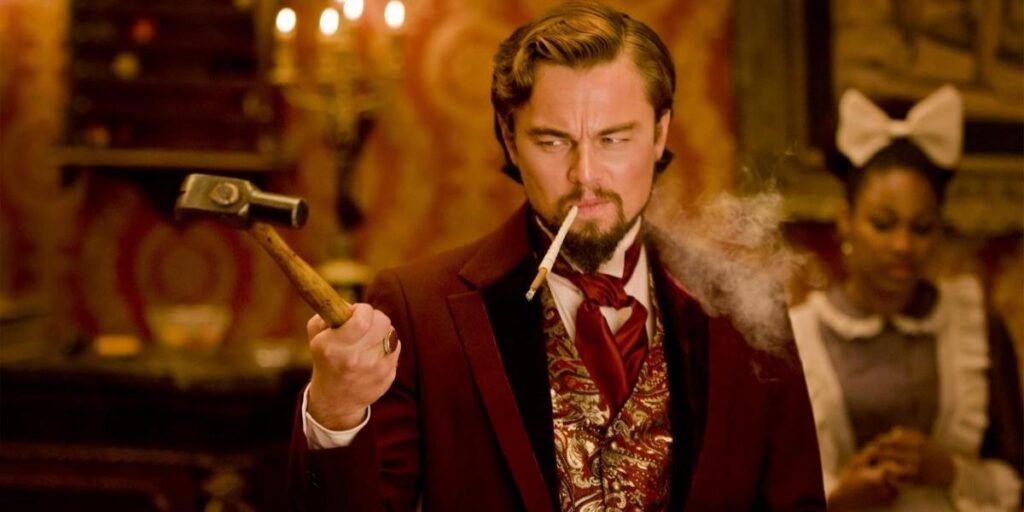
| Release date | 2012 |
| Genre | Western, Drama |
| Key cast | Jamie Foxx, Christoph Waltz, Leonardo DiCaprio, Kerry Washington, Samuel L. Jackson |
| Budget | $100 million |
| Box office | $425 million |
This movie portrays the harrowing journey of Django (Foxx), a freed slave, as he partners with bounty hunter Dr. King Schultz (Waltz) to rescue his wife, Broomhilda (Washington), from the malevolent plantation owner, Calvin Candie (DiCaprio).
View Calvin Candie in our best movie villains (ranked)
A bold reinterpretation of the Spaghetti Western genre, Tarantino infuses the movie with his iconic dialogue, dark humor, and striking violence. The eclectic soundtrack marries classic western sounds with contemporary tracks, echoing the film’s blend of old and new.
“Django Unchained” pulls no punches in its portrayal of the brutalities of slavery while offering a satisfying tale of revenge. DiCaprio’s role as the sinister Candie departed from his usual roles, showcasing his range and adding depth to the film. Its fearless storytelling and exceptional performances cement its place among the best Quentin Tarantino films.
#4 Reservoir Dogs
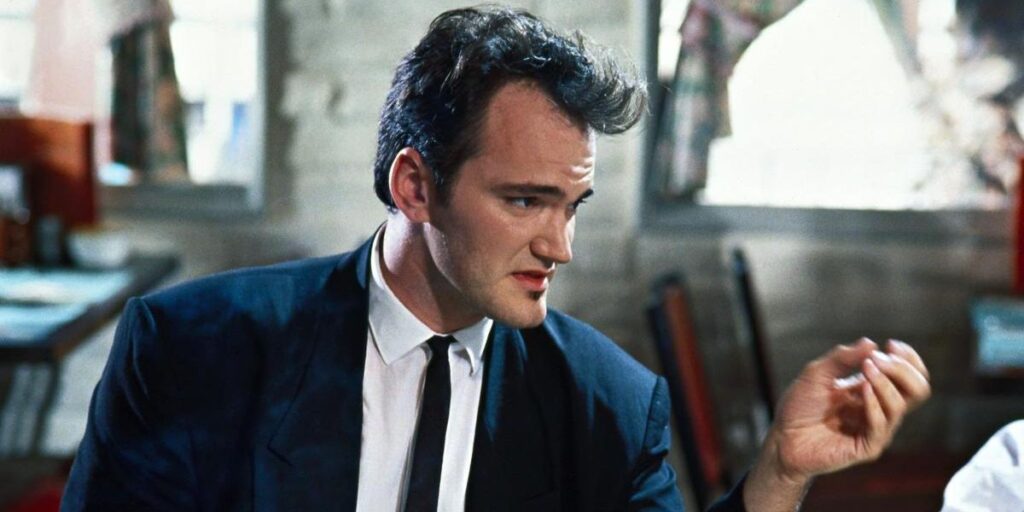
| Release date | 1992 |
| Genre | Crime, Drama |
| Key cast | Harvey Keitel, Tim Roth, Michael Madsen, Steve Buscemi, Chris Penn |
| Budget | $1.2 million |
| Box office | $2.8 million |
Tarantino’s directorial debut, “Reservoir Dogs”, revolves around a botched robbery and its aftermath. As suspicions rise and loyalties waver, the criminals try to figure out what went wrong and who amongst them might be an undercover cop.
This movie introduced audiences to Tarantino’s trademarks: non-linear storytelling, sharp and rapid-fire dialogues, memorable soundtracks, and graphic, stylized violence. The film’s minimalist setting, primarily within a warehouse, intensifies the drama and character interactions, making every gesture and dialogue pivotal.
“Reservoir Dogs” might not have the grandeur or complexity of some of Tarantino’s later works, but it’s raw, intense, and showcases his budding genius. The film’s confined setting and limited budget did not restrict Tarantino’s vision, proving that a simple premise can be transformed into a cinematic tour de force with a strong script and character development.
#3 Inglourious Basterds
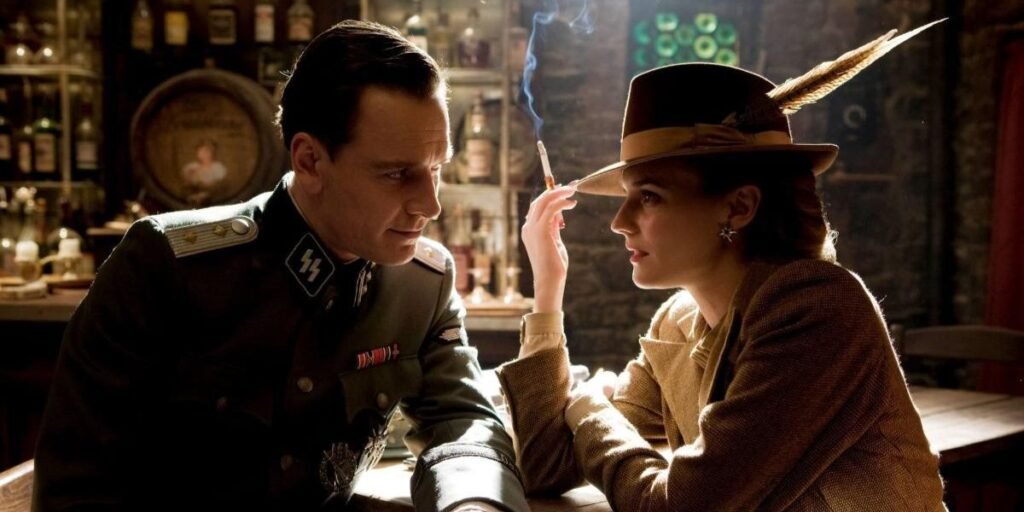
| Release date | 2009 |
| Genre | War, Drama |
| Key cast | Brad Pitt, Christoph Waltz, Mélanie Laurent, Michael Fassbender, Eli Roth |
| Budget | $70 million |
| Box office | $321 million |
Set during World War II, “Inglourious Basterds” follows two parallel plots to assassinate Nazi leaders. One by a group of Jewish U.S. soldiers led by Lt. Aldo Raine (Pitt) and another by a theater owner, Shosanna (Laurent), who has her own personal vendetta against the Nazis.
In this audacious reimagining of history, Tarantino blends intense drama with his signature wit and humor. Employing a multi-lingual script and long, tension-filled scenes, the movie stands out for its meticulous attention to detail and dialogue-driven suspense, most notably in the opening sequence with Col. Hans Landa (Waltz).
This movie showcases Tarantino’s ability to take a dark chapter of history and inject it with layers of fiction, dialogue, and character arcs. Christoph Waltz’s portrayal of the cunning Landa earned him an Academy Award, and the movie solidified its spot as one of the best Tarantino movies by masterfully balancing history with Tarantino’s distinct style.
#2 Kill Bill: Vol. 1 & Vol. 2
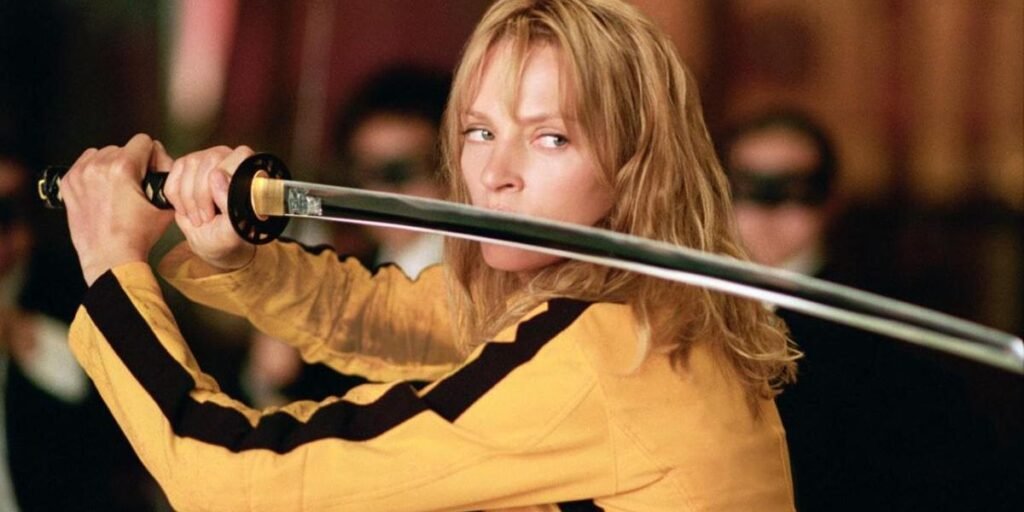
| Release date | 2003 & 2004 |
| Genre | Action, Crime |
| Key cast | Uma Thurman, David Carradine, Lucy Liu, Daryl Hannah, Michael Madsen |
| Budget | $60 million (combined) |
| Box office | $333 million (combined) |
An epic tale of revenge, “Kill Bill” unfolds as The Bride (Uma Thurman), a former assassin, wakes from a four-year coma to take vengeance on her former colleagues who betrayed her. This two-part saga sees her battling her way to the ultimate target: Bill (David Carradine), her ex-lover and the Deadly Viper Assassination Squad leader.
These films are Tarantino’s tribute to grindhouse cinema, samurai movies, martial arts films, and spaghetti westerns. The razor-sharp swordplay, split screens, and a mesmerizing soundtrack are all integral elements of his vision. The vibrant color palette of Vol. 1 contrasts brilliantly with the more grounded and dialogue-heavy Vol. 2, showcasing Tarantino’s ability to oscillate between high-octane action and deep character exploration.
Kill Bill exemplifies Tarantino’s prowess in genre-blending. Every scene, from the Bride’s duel with O-Ren Ishii in the snowy garden to her poignant confrontation with Bill, is a testament to Tarantino’s mastery over the medium. The film’s combination of emotion, action, and soundtrack make it one of the best Quentin Tarantino movies memorable.
#1 Pulp Fiction
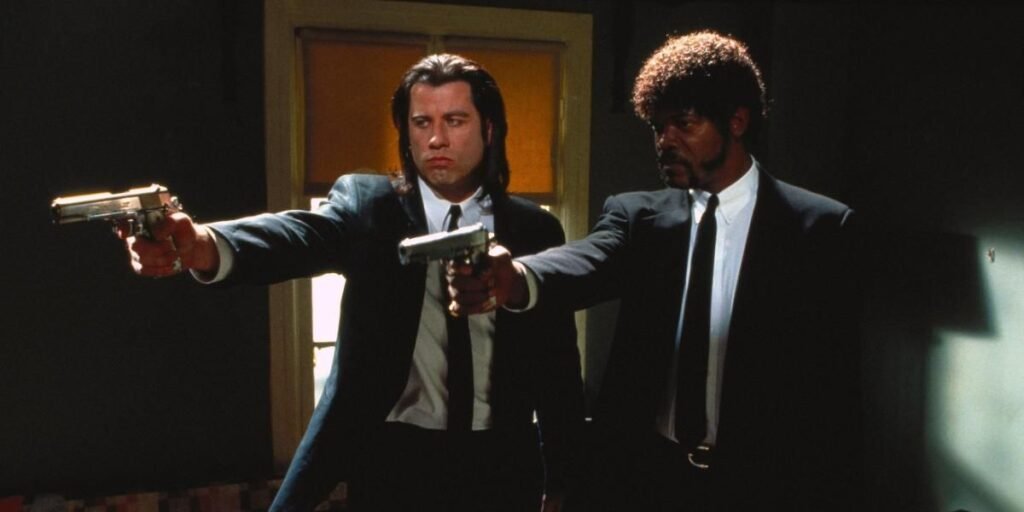
| Release date | 1994 |
| Genre | Crime, Drama |
| Key cast | John Travolta, Samuel L. Jackson, Uma Thurman, Bruce Willis |
| Budget | $8 million |
| Box office | $214 million |
A brilliant intertwining narrative, “Pulp Fiction” explores the interconnected lives of two mob hit men, a boxer, a gangster’s wife, and a pair of diner bandits. With its distinctive non-linear storyline, the movie delves deep into crime, redemption, and the often bizarre turns life can take in the underworld of Los Angeles.
Quentin Tarantino’s second feature movie solidified his reputation as a master of dialogue and storytelling, bringing us one of the best thriller crime dramas. The narrative easily flips between different timelines, making the ordinary seem extraordinary. The infusion of humor in unexpected places, combined with iconic dance scenes, memorable monologues, and that mysterious briefcase, illustrates Tarantino’s unique storytelling approach.
Beyond its inventive narrative structure, “Pulp Fiction” introduced audiences to Tarantino’s trademark style: sharp wit, intense action, compelling characters, and soundtracks that become characters in their own right. This movie was not just a hit—it was a cultural phenomenon, influencing a generation of filmmakers and establishing Tarantino as a maestro of modern cinema.
Unpacking Tarantino’s cinematic world
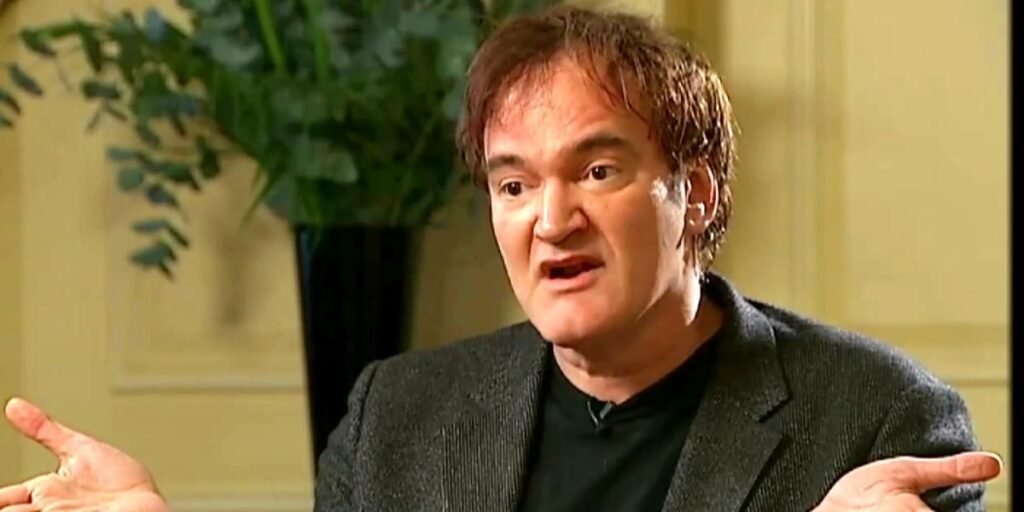
What defines a Quentin Tarantino movie?
Tarantino’s films are renowned for their distinctive style, blending sharp, witty dialogue, non-linear storylines, stylized violence, and an eclectic soundtrack that pays homage to various genres of music and film. They often feature interconnected stories, rich character development, and a unique mix of humor and tension.
What is Quentin Tarantino’s best movie?
While subjective, ‘Pulp Fiction’ is frequently hailed as Quentin Tarantino’s masterpiece. Its innovative narrative structure, depth of characters, and the seamless blend of humor and drama not only defined Tarantino’s filmmaking style but also left a lasting impact on cinema.
Has Quentin Tarantino won any major awards for his movies?
Yes, Quentin Tarantino has received numerous awards throughout his career, including two Academy Awards for Best Original Screenplay for ‘Pulp Fiction’ and ‘Django Unchained’. His unique cinematic contributions have been recognized and celebrated worldwide.
How many movies has Quentin Tarantino made?
Quentin Tarantino has directed ten feature films. He’s known for saying that he will only direct ten films, although this number includes only the films he has directed, not those he wrote the screenplay or produced.
Are all Tarantino movies connected?
Many of Tarantino’s films contain cross-references and shared elements, suggesting they exist within the same universe. This interconnectedness adds a layer of depth and enjoyment for fans.
How does Quentin Tarantino create tension in his films?
Tarantino masterfully crafts tension through a combination of dialogue, music, and pacing. His ability to build suspense in scenes, often leading to explosive climaxes, showcases his skill in manipulating the audience’s emotions.
What influences Tarantino’s filmmaking?
Various genres and styles heavily influenced Tarantino’s work, including Spaghetti Westerns, martial arts cinema, blaxploitation, and grindhouse films. His deep appreciation and knowledge of cinema history are evident in his tribute to these genres while adding his unique twist.
Why does Tarantino and Samuel L. Jackson work together a lot?
Quentin Tarantino and Samuel L. Jackson have developed a prolific partnership over the years, primarily because Tarantino deeply admires Jackson’s acting prowess and on-screen presence. Jackson brings a unique intensity and authenticity to his roles, which resonates with Tarantino’s distinctive storytelling style. Their collaboration is marked by mutual respect and a shared vision for the characters Jackson portrays, making their films together standout pieces in cinematic history.
Quentin Tarantino’s distinctive style has cemented him as one of the best directors ever. Each movie is a cinematic event, blending genres and defying expectations. His influence on filmmaking undeniably ensures his place in cinema’s illustrious history. Dive in, and experience the genius yourself.
